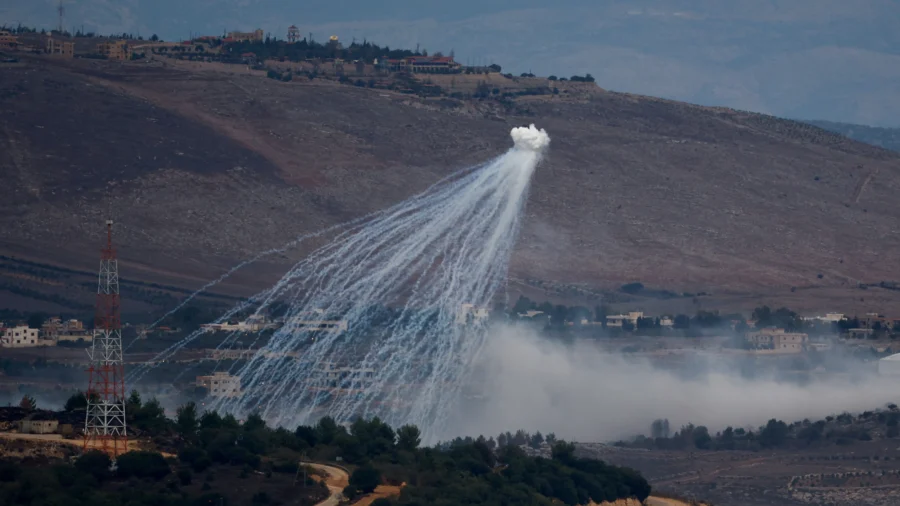The Biden White House acknowledged reports that Israeli forces may have misused U.S.-supplied white phosphorus against Lebanon in at least one cross-border skirmish in October and indicated the U.S. would look into the incident.
White phosphorus is a component sometimes used in smoke, illumination, and incendiary munitions.
While its use as a smoke-producing agent is not necessarily problematic, the use of white phosphorus as an incendiary weapon could run afoul of Article 1 of Protocol III of the 1980 United Nations Convention on Certain Conventional Weapons.
White phosphorus ignites when exposed to air at around 86° Fahrenheit and burns at a high temperature.
It can stick to various surfaces including skin, and is difficult to extinguish, thus raising the risk of deadly burns if particles of burning white phosphorus fall on someone.
The smoke that white phosphorus munitions produce can also pose a risk of asphyxiation and respiratory damage when introduced in confined spaces.
Israeli forces were suspected of using white phosphorus artillery shells during a cross-border skirmish on Oct. 16.
According to a Washington Post investigation, Israeli forces shelled the Lebanese border town of Dheira (also spelled Dhayra) for hours into the evening, trapping residents in their homes until the fighting relented at around 7 a.m. the following morning.
Shell Fragments Matched
At least nine people were reportedly injured in the Oct. 16 artillery strikes, including three who were hospitalized.
A journalist working for the Washington Post subsequently entered Dheira and photographed shell fragments from the strikes. The publication found lot production numbers on the shell fragments and reportedly matched those numbers to various U.S. munitions batches.
The Washington Post also questioned the continued use of white phosphorus munitions at night, noting that the smoke produced by such munitions would have had limited utility by that point and there were no Israeli forces close to the border for which to obscure with smoke.
Some residents reportedly told the newspaper they believe the Israelis used the white phosphorus munitions to drive them out of the town and make it easier for Israel to continue military operations in the area.
The human rights organization Amnesty International has been calling for the Oct. 16 artillery strikes in and around Dheira to be investigated as a possible war crime since late October.
The organization raised concerns about at least three additional incidents involving Israeli forces using white phosphorus munitions in strikes across southern Lebanon between Oct. 10 and Oct. 16.
White House National Security Council coordinator John Kirby acknowledged the concerns raised in the Washington Post investigation during a press gaggle aboard Air Force One on Dec. 11.
“We’ve seen the reports. Certainly concerned about that. We’ll be asking questions to try to learn a little bit more,” Mr. Kirby said.
He cautioned that there may have been a legitimate cause for the use of white phosphorus munitions during these cross-border strikes in October.
“I do think it’s important to remind that white phosphorus does have a legitimate military utility in terms of illumination and producing smoke to conceal movements,” he said.
“And obviously, anytime that we provide items like white phosphorus to another military, it is with the full expectation that it will be used in keeping with those legitimate purposes and in keeping with the law of armed conflict.”
Israelis Deny Misuse
The Israeli military has denied misusing its white phosphorus munitions, saying that such rounds are used only for illumination and smoke screens and not for targeting or setting fires. An Israeli Defense Forces spokesperson said its restriction on the use of such munitions “complies and goes beyond the requirements of international law.”
Still, Israel’s reported use of white phosphorus munitions could elicit new criticism as Israel already faces pushback over its military operations against Hamas in the Gaza Strip. The current Israel-Hamas conflict began after Hamas gunmen breached the Israel-Gaza barrier on Oct. 7 and killed hundreds of people.
The Biden administration has already begun urging their Israeli counterparts to make greater efforts to avoid civilian deaths in the ongoing conflict in the Gaza Strip.
As lawmakers continue to debate a new supplemental spending package that would provide new military aid to Israel, some Democrats are seeking to tie such military aid to new humanitarian and law of armed conflict compliance requirements.
‘Don’t Want to See Second Front’
Mr. Kirby said the Biden administration is also concerned that Israel’s reported use of white phosphorus munitions could spell a wider regional conflict than the ongoing battle in the Gaza Strip.
“We absolutely don’t want to see this conflict spill over into Lebanon. We don’t want to see a second front. We don’t want to see it escalate and widen,” Mr. Kirby said. “And so, it is also in the context of that that we’re—we’re concerned about these reports.”
Over the weekend, Israeli National Security Adviser Tzachi Hanegbi warned that a wider conflict between Israel and Hezbollah forces in Lebanon may be inevitable if more is not done to keep Hezbollah away from the Israeli-Lebanon border.
He said Israel’s current concern is that Hezbollah gunmen could storm across Israel’s borders and carry out an attack similar to the one Hamas carried out in October.


